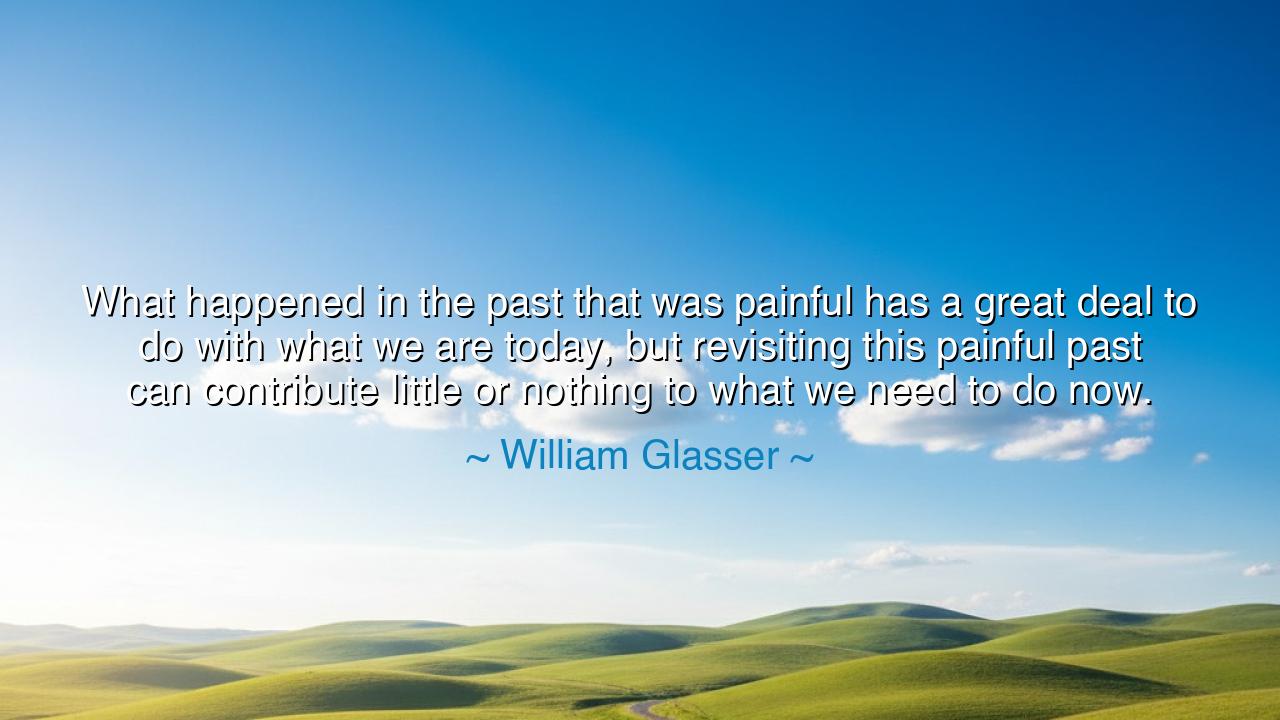
What happened in the past that was painful has a great deal to do
What happened in the past that was painful has a great deal to do with what we are today, but revisiting this painful past can contribute little or nothing to what we need to do now.






Hear me, O children of reflection, for in the words of William Glasser lies a truth forged in the fires of human suffering and rebirth: “What happened in the past that was painful has a great deal to do with what we are today, but revisiting this painful past can contribute little or nothing to what we need to do now.” This is a teaching as profound as it is liberating. It speaks not of denial, but of release—of the wisdom to honor the past without becoming its prisoner. For the past, though it shapes the vessel, must not command the voyage.
From the ancient times, wise men have taught that memory is both a treasure and a torment. It can guide, or it can bind. The Stoics of Greece and Rome spoke often of this truth: that a man should not drown in yesterday’s storms when the winds of today still call him to sail. Glasser, in his modern wisdom, echoes that same philosophy—that while pain molds the soul, dwelling upon it weakens the will to act. The past is the forge, but the present is the blade.
Consider the tale of Nelson Mandela, who spent twenty-seven years in the cold stone silence of prison. He had every reason to look backward, to let bitterness devour him. Yet when he emerged from confinement, he turned not to vengeance, but to purpose. “Resentment,” he said, “is like drinking poison and hoping it will kill your enemies.” Mandela lived Glasser’s truth: he acknowledged the pain of the past, but refused to be ruled by it. His greatness came not from remembering the chains, but from choosing freedom anew each day.
So too must we understand that revisiting our pain, over and over, does not heal us—it deepens the wound. The mind that constantly replays its sorrows is like a man endlessly sharpening his sword upon the same stone, until the blade is worn away. Glasser’s wisdom reminds us that reflection is valuable only when it serves transformation. To learn from the past is noble; to live in it is to die before death.
The ancients knew this well. The Buddha, when asked about the path to enlightenment, said: “Do not dwell in the past, do not dream of the future, concentrate the mind on the present moment.” The past is a teacher, not a master. Once its lesson is learned, one must walk forward in courage, bearing wisdom but leaving behind the ashes. Freedom begins when remembrance ends where usefulness ceases.
Let us, then, take this lesson into our daily lives. Each man and woman carries within them the weight of mistakes, betrayals, and losses. But we must not mistake pain for purpose. Ask yourself not, “Why did this happen to me?” but rather, “What can I create from what has happened?” The first question ties you to sorrow; the second awakens your power. The future demands builders, not mourners.
Practical wisdom follows. If your past wounds whisper to you, listen—but briefly. Extract the lesson, the insight, the strength hidden beneath the scars, and then turn your eyes forward. Do not build your home in the ruins of yesterday. Instead, carry the stones and build something new. Journal your lessons, not your laments. Speak not endlessly of what hurt you, but of what you learned and how you will rise.
Thus, the teaching of William Glasser resounds through the ages: the past explains, but it does not define; the pain teaches, but it does not command. The wise look back only long enough to learn—and then they walk on, unburdened, into the radiant horizon of the now. For life, ever-flowing and ever-new, belongs not to those who remember the most, but to those who choose to begin again.






AAdministratorAdministrator
Welcome, honored guests. Please leave a comment, we will respond soon